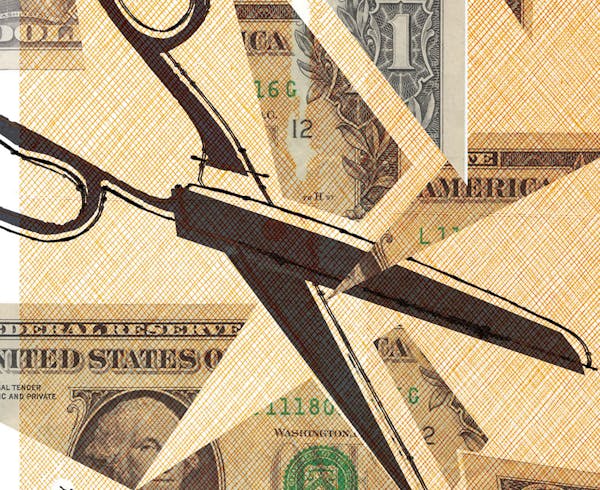It's only fair, DFL Gov. Mark Dayton argues, for him to ask businesses to pay a sales tax when they buy services from a lawyer or an accountant if he's asking households to pay that tax too.
But the tax he proposes would make some businesses more than occasional payers of a new sales tax. Providers of business services would become tax collectors -- in some cases, on 100 percent of their revenue. Many would have little or no ability to pass on the tax to their customers.
That's not fair. It's not competitive. It's not good for Minnesota's recovering economy. And it runs counter to Dayton's stated desire to shield middle-class Minnesotans from higher taxes. They would wind up paying tax hikes hidden in higher prices and, for workers in the most affected industries, in lower wages and lost jobs.
Relying heavily on this revenue source suggests that the administration either did not understand its implications, or understood but did not deem them important. Either explanation is troubling.
We urge Dayton to reconsider and the Legislature to reject a sales tax on business-to-business services, a tax idea the Star Tribune has long opposed. While expanding the consumption sales tax to a larger share of the economy and reducing its overall rate, as Dayton proposes, is sound tax policy, taxing businesses' service inputs is anything but.
A tax on business-to-business services would distort the choices businesses make about purchasing or keeping in-house accounting, legal and computer services. It would favor large companies with big back-office operations over small firms. It would put Minnesota engineering, architectural, scientific and consulting firms at a disadvantage. And it would turn the sales tax into a price inflator of every Minnesota-made product through a process economists call "tax pyramiding."
For example, a law firm would pay tax on its cleaning service, and add that cost to the legal bill it sends to a trucking company, which would pay tax on that bill and pass the cost on in its charges to a farmer, who would pay tax yet again on the whole accumulating amount. At that point, the state's long-standing policy of not applying sales tax to food will have faltered.
Consider the impact on one particular industry sector -- one this Editorial Board serves and understands well -- advertising, information and communications. Providers of those services together employ nearly 68,000 Minnesotans. Many of them serve clients outside Minnesota and compete with rivals around the country and the globe.
The American Association of Advertising Agencies ranks the Twin Cities ad industry ninth-largest nationally and second-largest in the Midwest. It reports that none of the top eight markets have a tax commensurate with the one Dayton proposes. A cautionary tale can be found in Florida, where in 1987 a sales tax was placed on advertising and a range of similar services. An advertising boycott quickly ensued. So did a repeal of the tax, only six months after its passage.
Doug Spong, president of Carmichael Lynch, said that 90 percent of his Minneapolis agency's clients are based outside Minnesota. Competitive pressure limits his ability to pass a sales tax on to his clients through higher fees. Instead, his agency's jobs and payroll would suffer if the proposed tax becomes law.
"There's a reason that other states don't have this tax," Spong said. He likened it to a "huge tariff" that would "shut down the trade for clients coming to Minnesota."
More than large enterprises would be affected. Sole proprietor David Aquilina, a "strategic storyteller" whose PR business is based in Minneapolis, said he would be contractually obliged to absorb all of Dayton's proposed 5.5 percent tax.
"I will have to pass along the full cost of the tax to my employee: me," Aquilina said. The proposed tax "would effectively impose a 5.5 percent cut in the top-line revenue of my business and in my income."
News media, including the Star Tribune, would be socked at a time when transformative technology is already rocking bottom lines. For newspapers, the proposed tax would apply to revenue derived from both advertising and circulation, as well as to their purchases of legal, accounting, computer and telemarketing services. The revenue reduction that would result would diminish the journalism on which an informed citizenry depends.
The business-to-business sales tax is but one part of the wide-ranging tax reform Dayton seeks this year -- but it's a major portion, generating more than $2 billion in new revenue over the biennium, $1.5 billlion in fiscal 2015 alone.
State Revenue Commissioner Myron Frans has cautioned against singling out unpopular features of Dayton's plan for elimination, arguing that such moves could nullify desirable ones too. The business-to-business sales tax is so damaging that we're willing to take that chance.
We plan to share with readers in coming weeks an alternative that omits this wrongheaded tax but still eliminates the forecasted $1.1 billion state deficit and makes strategic investments in critical budget areas. Meanwhile, we invite Minnesotans to share their views on what constitutes tax fairness and tax competitiveness, and how best to achieve both.
-----
An editorial of the Star Tribune, Minnesota. Follow us on Twitter and Facebook.

The little park that could … be better
Climate change looms large this election year
For this Minnesota legislator, action targeting child abuse is intensely personal


